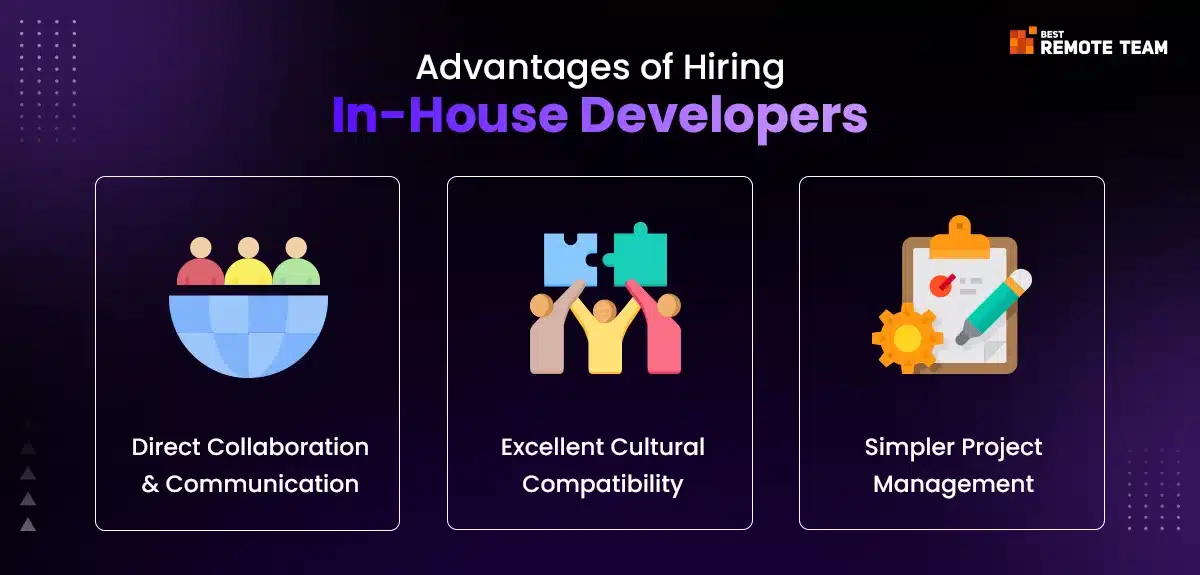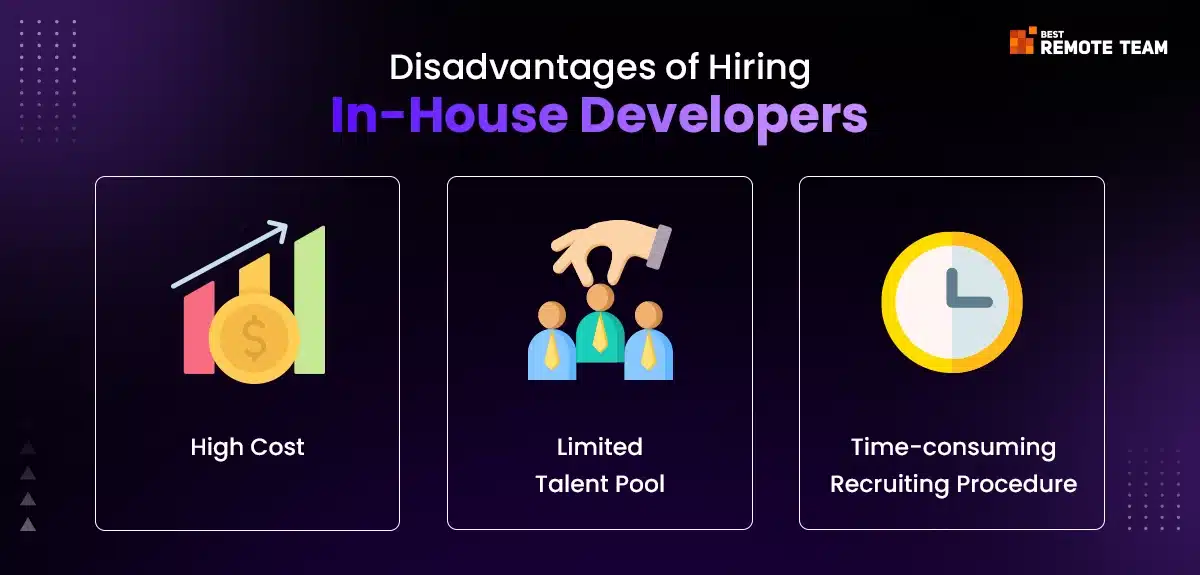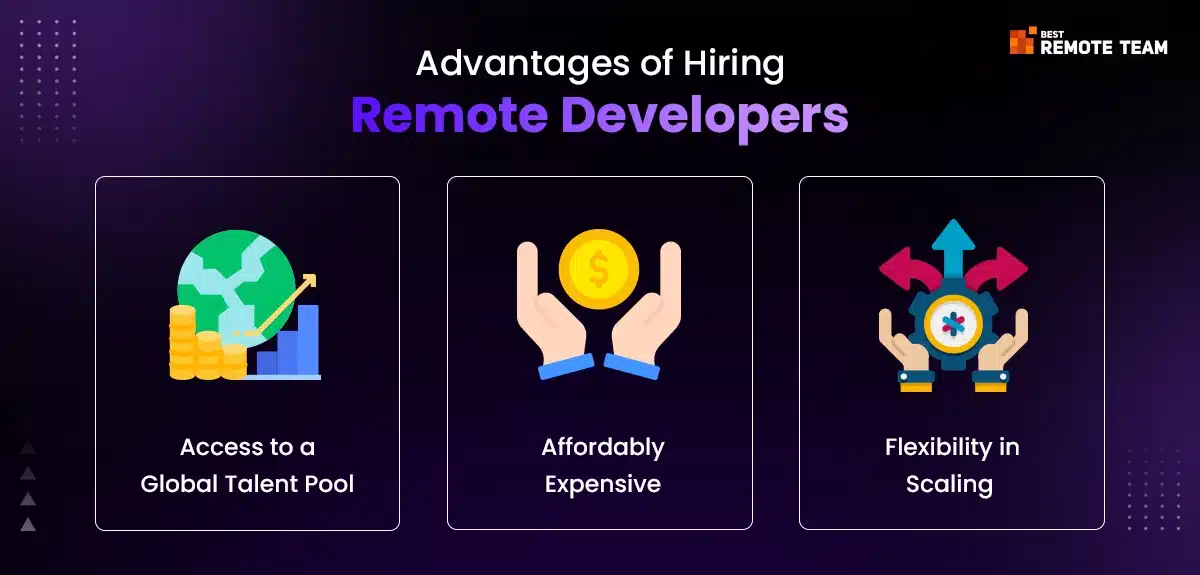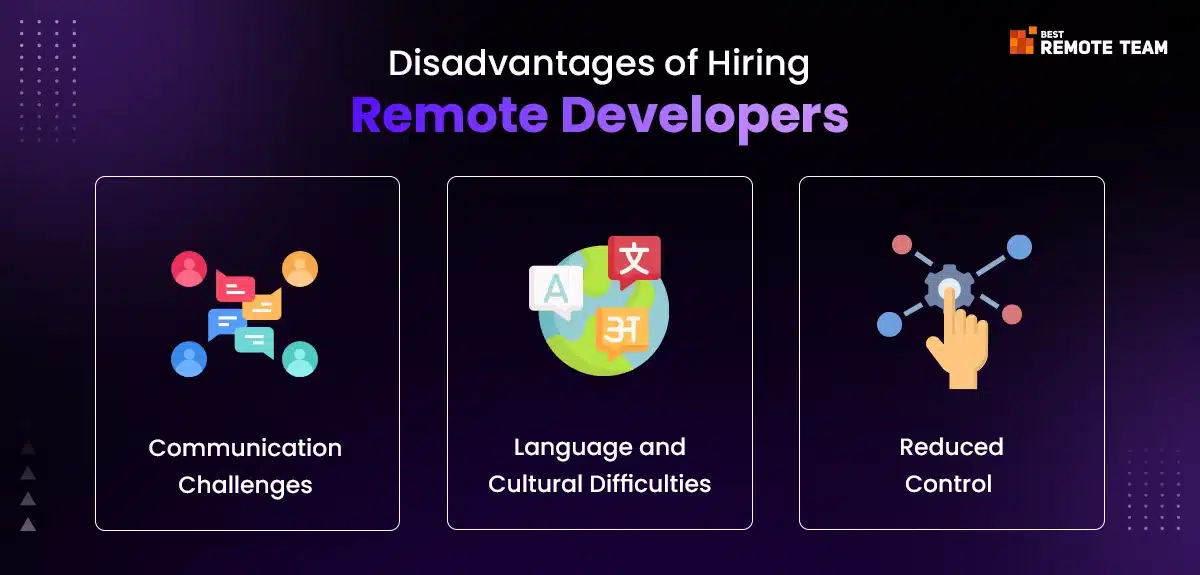What is an In-House Developer?
Full-time personnel working on-site at the corporate physical office are in-house developers. These developers are ingrained into the corporate culture by participating in daily meetings, conversations, and events supporting the firm’s expansion. Usually providing more direct communication and teamwork, in-house development teams might be helpful for certain companies.
Pros of Hiring In-House Developers
Hiring in-house developers offers several distinct advantages for businesses:
Direct Collaboration and Communication
Hiring in-house developers mostly helps you to be able to immediately and face-to-face collaborate. With an in-house team, communication is more open. Team members may instantly solve problems and generate ideas free from the lag resulting from various time zones or distant technical obstacles.
Excellent Cultural Compatibility
As in-house developers enter the everyday lives of the business, they help to improve alignment with its work culture, objectives, and purpose. This alignment over time encourages loyalty and a better awareness of the organization’s long-term goal, producing more involved workers.
Simpler Project Management
Especially in cases of complicated projects requiring continuous monitoring and fast input, managing an in-house team is usually easier than managing remote personnel. Regular stand-up meetings and managers’ direct monitoring help guarantee that the project remains on target.
Cons of Hiring In-House Developers
While in-house developers offer many advantages, there are also some potential drawbacks to consider:
High Cost
The expense is one of the main disadvantages of in-house against offshore developers. Cost of hiring developers, their wages, and overhead expenses such as office space, tools, utilities, insurance, and staff perks. For startups or smaller companies, in particular, these expenses quickly mount up.
Limited Talent Pool
Hiring in-house limits the possible pool of developers by only allowing local expertise. Finding the appropriate developers with the talents your project calls for might be challenging in areas where tech expertise is in great demand. Furthermore, driving up prices are relocation charges for elite personnel.
Time-Consuming Recruiting Procedure
Hiring in-house engineers may take a lot of time, including many rounds of interviews, tests, and background searches. This protracted recruiting procedure might hold down the general project schedule, particularly in urgent demand for development resources.
People also read: Hourly Rates vs. Fixed Costs: A Business Owner’s Guide
What is a Remote Developer?
Remote developers are a team working from their home or any place that is not the company’s office. Usually from various cities, nations, or continents, remote developers operate from sites outside the corporate physical office. These developers could be full-time workers from home or co-working environments or freelancers. Remote development teams are becoming more and more feasible and popular as communication technology and cloud platforms mature.
Pros of Hiring Remote Developers
Hiring remote developers offers several advantages for businesses:
Access to a Global Talent Pool
Employing remote developers lets businesses use a huge worldwide pool of talent. This implies that you may locate developers with specific knowledge and expertise almost everywhere in the globe. It offers access to several viewpoints, which stimulates more creative ideas.
Affordably Expensive
Cost reductions are among remote development teams most important benefits. Companies may cut their running expenses greatly without having to maintain office space, utilities, and tools for remote workers. Moreover, remote development teams can have lower wage expectations, especially when recruiting from areas with lower living expenses.
Flexibility in Scaling
Project needs often allow remote teams to be scaled up or down more easily. Depending on the workload, you could engage remote devs part-time or project-by-project. This adaptability lets companies change their staff in response to changing project needs, free from long-term commitments.
Cons of Hiring Remote Developers
While remote developers offer many advantages, there are also some potential drawbacks to consider:
Communication Challenges
Lack of face-to-face contact is one of the main difficulties in managing remote development teams. Building the same degree of rapport and flawless communication as with an in-house team may be challenging, even with the availability of video conferences, chats, and collaborative tools. Variations in time zones may also cause project delays and slow down responses.
Language and Cultural Difficulties
Cultural and linguistic barriers often cause misconceptions or mismatched expectations when employing remote developers from other nations. Regarding work ethics, communication style, and project objectives, it’s crucial to make sure every team member agrees.
Reduced Control
Managing a remote development team often implies less direct control, which may be difficult for managers used to in-person teamwork. Even if technologies like Slack, Asana, and Jira assist in keeping everyone in line, tracking the development and guaranteeing that deadlines are reached may still be challenging.
People also read: How to Manage an Offshore Technical Team?
When to Choose In-House Developers?
Choosing in-house developers is ideal in the following situations:
Long-Term Plans: An in-house team can be better in line with the objectives and vision of your business if you are working on long-term projects needing ongoing updates and changes.
Complex Projects: In-house developers provide the benefit of direct contact and improved cooperation for initiatives with great complexity involving many teams and stakeholders.
Corporate Loyalty & Culture: If you want to create a strong, cohesive team that embodies the values and culture of your firm, in-house developers provide a better fit with your corporate goal.
Instantaneous Support: When quick reaction times are vital, like in sectors like banking or e-commerce, an in-house staff can diagnose and fix issues quicker than a remote team operating across many time zones.
When to Choose Remote Developers?
Choose remote development teams for when:
Cost Efficiency is Crucial: Remote developers provide a more affordable answer if cutting expenses is a top concern, particularly for small companies or startups. You access worldwide talent and save on overheads like office space and perks.
Availability of Specialized Skills: Remote developers have the benefit of transcending local talent pools for specialty projects calling for highly specialized knowledge. For artificial intelligence, blockchain, or other developing technologies, especially, this is very helpful.
Flexible or Temporary Projects: Short-term projects or companies with changing workloads benefit most from remote developers. They provide the freedom to engage on-demand, free from long-term obligations.
Scalableness: Remote teams provide the freedom to expand or downsize your staff without the drawn-out internal recruiting procedure if your company must rapidly expand its development capabilities.
Conclusion
Your company’s demands, project objectives, and budget will determine whether in-house or remote developers best fit you. Though they have more expenses, in-house teams provide improved cooperation, cultural alignment, and real-time assistance. Hiring remote developers may, on the other hand, provide flexibility, cost savings, and access to a worldwide talent pool but might complicate project management and communication. Analyzing your project needs, schedules, and expansion goals will enable you to decide which course of action best fits your company.
At Best Remote Team, we have a team of dedicated developers with hands-on expertise in exceeding your development needs. Our team holds the great capabilities to develop feature rich applications that define your brand.
Contact us today to hire a developer who allows you to make the most of the development.









